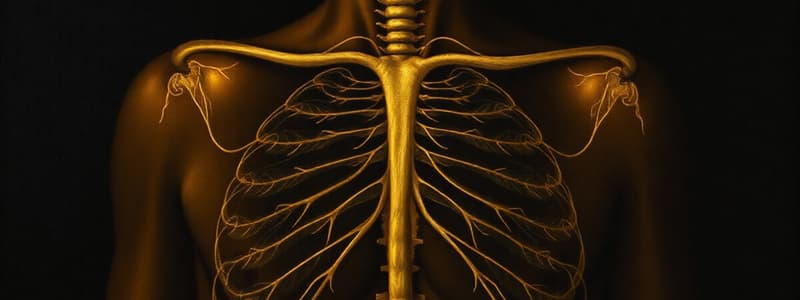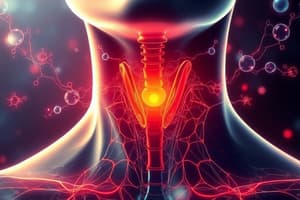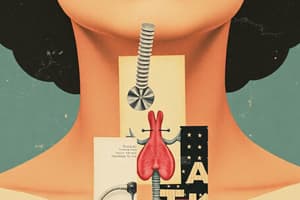Podcast
Questions and Answers
Which hormone is produced by the pineal gland?
Which hormone is produced by the pineal gland?
- Estrogen
- Insulin
- Testosterone
- Melatonin (correct)
What is the main function of the hypothalamus in relation to the endocrine system?
What is the main function of the hypothalamus in relation to the endocrine system?
- Directly controlling growth and development.
- Regulating metabolism and energy production.
- Linking the nervous system and endocrine system. (correct)
- Producing sex hormones like testosterone and estrogen.
Which bodily function is NOT directly influenced by hormones secreted by endocrine glands?
Which bodily function is NOT directly influenced by hormones secreted by endocrine glands?
- Immune system function
- Response to stress
- Regulation of electrolyte balance
- Production of blood cells (correct)
What happens when hormone levels in the blood rise?
What happens when hormone levels in the blood rise?
Which of the following is NOT directly regulated by hormones?
Which of the following is NOT directly regulated by hormones?
What is a potential consequence of a hormone imbalance?
What is a potential consequence of a hormone imbalance?
Besides exercise and a healthy diet, what is another recommendation for maintaining a healthy endocrine system?
Besides exercise and a healthy diet, what is another recommendation for maintaining a healthy endocrine system?
What should you do if you have a family history of diabetes, thyroid disorders, or PCOS?
What should you do if you have a family history of diabetes, thyroid disorders, or PCOS?
Which bodily function is NOT primarily regulated by the thyroid gland?
Which bodily function is NOT primarily regulated by the thyroid gland?
What is the primary function of thyroid hormones T3 and T4?
What is the primary function of thyroid hormones T3 and T4?
Which of the following is a common symptom of hyperthyroidism?
Which of the following is a common symptom of hyperthyroidism?
Where is the thyroid gland located in the body?
Where is the thyroid gland located in the body?
What is the definition of hyperthyroidism?
What is the definition of hyperthyroidism?
Which of the following is NOT a typical symptom of hypoglycemia?
Which of the following is NOT a typical symptom of hypoglycemia?
Which of the following treatments is most appropriate for hypoglycemia?
Which of the following treatments is most appropriate for hypoglycemia?
Which of the following is a symptom of hyperglycemia?
Which of the following is a symptom of hyperglycemia?
What is the underlying cause of Type 1 diabetes?
What is the underlying cause of Type 1 diabetes?
Which of the following is a key characteristic of Type 1 diabetes symptoms compared to Type 2?
Which of the following is a key characteristic of Type 1 diabetes symptoms compared to Type 2?
Why is lifelong insulin therapy essential for individuals with Type 1 diabetes?
Why is lifelong insulin therapy essential for individuals with Type 1 diabetes?
Which of the following is NOT a common symptom of Type 1 diabetes?
Which of the following is NOT a common symptom of Type 1 diabetes?
What is the primary goal of managing Type 1 diabetes?
What is the primary goal of managing Type 1 diabetes?
How does regular exercise benefit individuals with Type 1 diabetes?
How does regular exercise benefit individuals with Type 1 diabetes?
Which symptom is LEAST likely to be associated with hyperthyroidism?
Which symptom is LEAST likely to be associated with hyperthyroidism?
What is the role of Continuous Glucose Monitoring (CGM) in managing Type 1 diabetes?
What is the role of Continuous Glucose Monitoring (CGM) in managing Type 1 diabetes?
Besides insulin therapy and regular blood sugar monitoring, what other lifestyle adjustments are crucial for treating type 1 diabetes?
Besides insulin therapy and regular blood sugar monitoring, what other lifestyle adjustments are crucial for treating type 1 diabetes?
What percentage of hyperthyroidism cases is Graves' disease responsible for?
What percentage of hyperthyroidism cases is Graves' disease responsible for?
Which of the following is a potential outcome of experiencing thyroiditis?
Which of the following is a potential outcome of experiencing thyroiditis?
How does radioiodine therapy work to treat hyperthyroidism?
How does radioiodine therapy work to treat hyperthyroidism?
Why might consuming excess iodine lead to hyperthyroidism in some individuals?
Why might consuming excess iodine lead to hyperthyroidism in some individuals?
Which class of medications is used to quickly alleviate symptoms like tremors and rapid heartbeat associated with hyperthyroidism while waiting for other treatments to take effect?
Which class of medications is used to quickly alleviate symptoms like tremors and rapid heartbeat associated with hyperthyroidism while waiting for other treatments to take effect?
Which of the following characteristics applies to thyroid nodules?
Which of the following characteristics applies to thyroid nodules?
Which of the following is a heredity condition?
Which of the following is a heredity condition?
Which condition might necessitate surgery to remove part of the thyroid gland?
Which condition might necessitate surgery to remove part of the thyroid gland?
What is the primary function of thyroid hormones T3 and T4, within the human body?
What is the primary function of thyroid hormones T3 and T4, within the human body?
Which of the following best describes the effect of radioactive iodine therapy on the thyroid gland?
Which of the following best describes the effect of radioactive iodine therapy on the thyroid gland?
What is the most common cause of hypothyroidism?
What is the most common cause of hypothyroidism?
Which medical condition can result from the partial or complete removal of the thyroid gland?
Which medical condition can result from the partial or complete removal of the thyroid gland?
Which of the following conditions is often treated with radioactive iodine therapy?
Which of the following conditions is often treated with radioactive iodine therapy?
What is the primary way that medications can induce hypothyroidism?
What is the primary way that medications can induce hypothyroidism?
In cases of thyroid gland removal leading to hypothyroidism, what type of treatment becomes necessary?
In cases of thyroid gland removal leading to hypothyroidism, what type of treatment becomes necessary?
Which hormone is NOT produced by the adrenal cortex?
Which hormone is NOT produced by the adrenal cortex?
A 24-hour urine test for pheochromocytoma diagnosis measures the levels of:
A 24-hour urine test for pheochromocytoma diagnosis measures the levels of:
What is the primary treatment for pheochromocytoma?
What is the primary treatment for pheochromocytoma?
Which of the following is a function of glucocorticoids like cortisol?
Which of the following is a function of glucocorticoids like cortisol?
Where are the adrenal glands located in the human body?
Where are the adrenal glands located in the human body?
What is the primary role of mineralocorticoids like aldosterone?
What is the primary role of mineralocorticoids like aldosterone?
Which diagnostic method might be pursued for patients with a family history of pheochromocytoma?
Which diagnostic method might be pursued for patients with a family history of pheochromocytoma?
Which of the following symptoms is commonly associated with pheochromocytoma?
Which of the following symptoms is commonly associated with pheochromocytoma?
Flashcards
Endocrine System
Endocrine System
A system of glands that produce hormones to regulate body functions.
Homeostasis
Homeostasis
The process of maintaining a stable internal environment in the body.
Hormones
Hormones
Chemical messengers produced by glands that regulate various functions.
Pituitary Gland
Pituitary Gland
Signup and view all the flashcards
Melatonin
Melatonin
Signup and view all the flashcards
Factors Affecting Hormones
Factors Affecting Hormones
Signup and view all the flashcards
Endocrine Health
Endocrine Health
Signup and view all the flashcards
Sex Hormones
Sex Hormones
Signup and view all the flashcards
Type 1 Diabetes
Type 1 Diabetes
Signup and view all the flashcards
Insulin Production
Insulin Production
Signup and view all the flashcards
Lifelong Insulin Therapy
Lifelong Insulin Therapy
Signup and view all the flashcards
Symptoms of Type 1 Diabetes
Symptoms of Type 1 Diabetes
Signup and view all the flashcards
Blood Sugar Monitoring
Blood Sugar Monitoring
Signup and view all the flashcards
Healthy Eating
Healthy Eating
Signup and view all the flashcards
Insulin Dosage Adjustments
Insulin Dosage Adjustments
Signup and view all the flashcards
Continuous Glucose Monitoring (CGM)
Continuous Glucose Monitoring (CGM)
Signup and view all the flashcards
Hypothyroidism
Hypothyroidism
Signup and view all the flashcards
Thyroid Gland
Thyroid Gland
Signup and view all the flashcards
Thyroid Hormones
Thyroid Hormones
Signup and view all the flashcards
Autoimmune Thyroiditis
Autoimmune Thyroiditis
Signup and view all the flashcards
Surgical Removal of Thyroid
Surgical Removal of Thyroid
Signup and view all the flashcards
Radiation Therapy Effects
Radiation Therapy Effects
Signup and view all the flashcards
Medications Impacting Thyroid
Medications Impacting Thyroid
Signup and view all the flashcards
Radioactive Iodine Therapy
Radioactive Iodine Therapy
Signup and view all the flashcards
Flushing
Flushing
Signup and view all the flashcards
Chest Pain
Chest Pain
Signup and view all the flashcards
Pheochromocytoma Diagnosis
Pheochromocytoma Diagnosis
Signup and view all the flashcards
24-hour Urine Test
24-hour Urine Test
Signup and view all the flashcards
Adrenal Gland Function
Adrenal Gland Function
Signup and view all the flashcards
Mineralocorticoids
Mineralocorticoids
Signup and view all the flashcards
Glucocorticoids
Glucocorticoids
Signup and view all the flashcards
Adrenal Androgens
Adrenal Androgens
Signup and view all the flashcards
Hyperthyroidism Symptoms
Hyperthyroidism Symptoms
Signup and view all the flashcards
Graves’ Disease
Graves’ Disease
Signup and view all the flashcards
Thyroid Nodules
Thyroid Nodules
Signup and view all the flashcards
Thyroiditis
Thyroiditis
Signup and view all the flashcards
Excess Iodine
Excess Iodine
Signup and view all the flashcards
Antithyroid Medicines
Antithyroid Medicines
Signup and view all the flashcards
Beta Blockers
Beta Blockers
Signup and view all the flashcards
Radioiodine Therapy
Radioiodine Therapy
Signup and view all the flashcards
Hypoglycemia Symptoms
Hypoglycemia Symptoms
Signup and view all the flashcards
Hyperglycemia Symptoms
Hyperglycemia Symptoms
Signup and view all the flashcards
Treatment for Hypoglycemia
Treatment for Hypoglycemia
Signup and view all the flashcards
Thyroid Gland Functions
Thyroid Gland Functions
Signup and view all the flashcards
Hormones produced by Thyroid
Hormones produced by Thyroid
Signup and view all the flashcards
Symptoms of Hyperthyroidism
Symptoms of Hyperthyroidism
Signup and view all the flashcards
Thyroid Imbalance Effects
Thyroid Imbalance Effects
Signup and view all the flashcards
Study Notes
Endocrine System Overview
- The endocrine system is a complex network of glands and organs in the human body that produce and secrete hormones.
- Hormones are chemical messengers that travel through the bloodstream to tissues or organs, regulating and controlling many physiological processes.
- Hormone systems, in addition to controlling bodily functions, include the hypothalamus, pituitary gland, pineal gland, thyroid gland, parathyroid glands, adrenal glands, pancreas, and reproductive organs (ovaries in females and testes in males).
Major Endocrine Glands
- Pituitary gland: Located at the base of the brain, often referred to as the "master gland," controlling other endocrine glands, regulating growth, reproduction, and other gland function.
- Thyroid gland: Located in the neck, producing hormones that regulate metabolism, growth, and development. These hormones control how quickly the body uses energy.
- Parathyroid glands: Four small glands located near the thyroid gland; they secrete parathyroid hormone, regulating calcium and phosphorus levels in the body.
- Adrenal glands: Located on top of the kidneys, producing hormones like cortisol for stress response/metabolism and adrenaline for "fight or flight" responses.
- Pancreas: Located behind the stomach; plays a crucial role in regulating blood sugar levels producing insulin and glucagon to control glucose metabolism.
- Gonads: (testes in males, ovaries in females) responsible for producing hormones such as testosterone and estrogen involved in sexual development and reproductive functions.
- Pineal gland: Located in the brain, producing melatonin, regulating sleep-wake cycles.
- Hypothalamus: Serves as a vital link between the nervous and endocrine systems, regulating numerous physiological processes and maintaining homeostasis.
Diabetes
- Diabetes is a condition where blood sugar (glucose) levels are too high.
- It develops when the pancreas can't produce enough insulin or when the body doesn't respond properly to insulin.
Type 1 Diabetes
- Chronic autoimmune condition.
- Pancreas produces little to no insulin.
- Immune system attacks insulin-producing cells in the pancreas.
- Requires lifelong insulin therapy.
Type 2 Diabetes
- Most common type.
- Body becomes resistant to insulin or doesn't produce enough.
- Often associated with poor diet, lack of physical activity, and excess body weight.
- Symptoms may develop gradually or not at all.
Hyperglycemia
- High blood sugar levels (above 126 mg/dL fasting or 200 mg/dL random)
- Associated with diabetes or other conditions.
- Can be caused by inadequate insulin production or resistance, unhealthy eating habits, lack of physical activity, stress, or illness.
Hypoglycemia
- Low blood sugar levels (below 70 mg/dL)
- Caused by diabetes medications, skipping or delaying meals, excessive alcohol consumption, certain medications, or medical conditions.
- Symptoms include sweating, pallor, irritability, hunger, weakness, headache, and loss of coordination.
Hyperthyroidism
- Overactive thyroid gland producing excessive thyroid hormones.
- Symptoms include rapid heartbeat, feeling shaky/nervous, weight loss, increased appetite, diarrhea, vision changes, and intolerance to heat.
Hypothyroidism
- Underactive thyroid gland producing insufficient or inadequate thyroid hormones.
- Symptoms include fatigue, weight gain, sensitivity to cold, constipation, hair loss, and decreased heart rate.
Hyperparathyroidism
- Overactive parathyroid glands producing too much parathyroid hormone (PTH).
- Causes high calcium levels in the bloodstream.
- Often caused by a non-cancerous growth (adenoma) or enlargement (hyperplasia) of the parathyroid glands.
Hypoparathyroidism
- Underactive parathyroid glands producing insufficient parathyroid hormone (PTH).
- Low calcium levels in the blood.
Addison's Disease
- Rare, life-threatening condition where adrenal glands don't produce enough steroid hormones (cortisol and aldosterone).
- Usually caused by an autoimmune disorder.
- Symptoms vary but include extreme fatigue, weight loss, low blood pressure, salt cravings, and hyperpigmentation.
Pheochromocytoma
- Rare tumor that develops in the adrenal glands.
- Produces excessive adrenaline and noradrenaline.
- Symptoms include high blood pressure, rapid heartbeat, headaches, sweating, tremors, anxiety, weight loss.
Adrenal Gland Disorders
- Problems with the adrenal glands
- The adrenal glands are responsible for making hormones and catecholamines.
- The adrenal cortex produces mineralocorticoids (aldosterone), glucocorticoids (cortisol), and adrenal androgens (DHEA, testosterone).
Cushing Syndrome
- High levels of the stress hormone cortisol.
- This can be caused by long-term glucocorticoid use or a tumor.
- Symptoms include upper body obesity, a "buffalo hump," a round face, thin extremities, easy bruising, and stretch marks.
SIADH versus DI
- SIADH (Syndrome of Inappropriate Antidiuretic Hormone) is characterized by the body retaining excessive water.
- DI (Diabetes Insipidus) is characterized by the body losing excessive water.
Neuropathy
- General term for any disease or dysfunction of the nervous system.
- Can affect nerves controlling movement, sensation, and organ function.
- Symptoms include numbness, tingling, pain, muscle weakness, and loss of coordination.
Studying That Suits You
Use AI to generate personalized quizzes and flashcards to suit your learning preferences.




